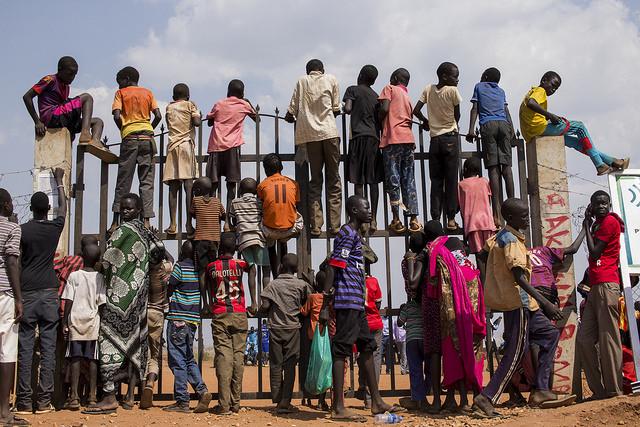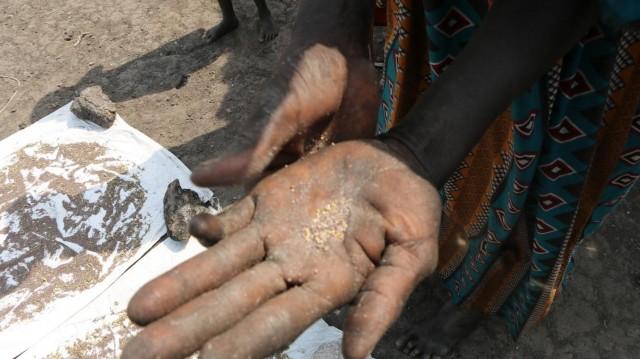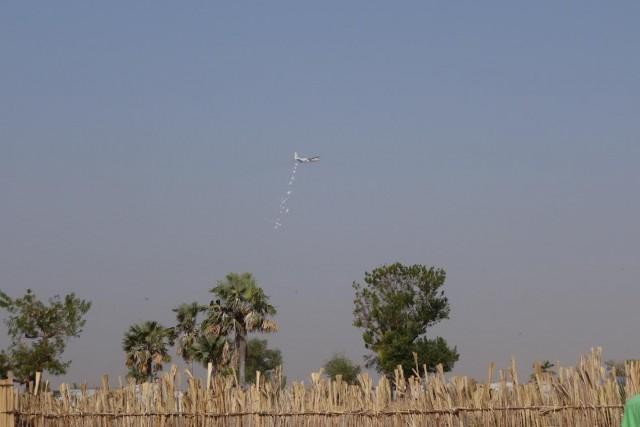An estimated 40,000 people in Unity State are facing catastrophic shortages in basic supplies. But it is not drought or environmental factors that have brought on this crisis.

Internally displaced South Sudanese children climb a gate in Juba. Credit: UN Photo/JC McIlwaine.
The horrific attack in the UN-run Malakal Protection of Civilians camp, which claimed the lives of 18 civilians and began on 17 February, is a harsh reminder that despite the stuttering peace process, the situation for South Sudan remains desperate. These were just some of the latest atrocities in a conflict that has claimed countless lives and left 2.8 million facing crisis-level food insecurity.
[See: UN peacekeepers in South Sudan: protecting some of the people some of the time]
I have just returned from South Sudan where I witnessed the impact of this man-made crisis first hand. Last week in Gondor village, Leer County, I met two women who were bent over a tarpaulin in front of their thatch-roofed home, preparing nothing but water lilies for dinner. They showed me how, by rubbing the dried flower seeds between their fingertips, they got at the “food” that they and so many thousands of others have subsisted on during the long months of war.
An estimated 40,000 people in Unity State, which has seen some of the worst violence and abuses since the armed conflict broke out in 2013, are facing catastrophic shortages in basic supplies. But it is not drought or environmental factors that have brought on their hunger. Their hunger is instead the consequence of regular and intentional attacks by government soldiers and allied militias, not only on food supplies – the cattle and crops that civilians rely on – but also on humanitarian agencies working in the country.
In southern Unity State, cattle raids by warring parties have left civilians without staples such as milk. Many subsist on water lilies and fish, but as flood waters have receded, even those food sources have become scarcer.
Although the fighting was supposed to have ended when the government and the political opposition signed a peace agreement last August, people say that attacks by state forces and allied militia continued into December. They describe killings, systematic and widespread abductions, rape, looting and the intentional destruction of civilian property.
In late January, a young mother in a camp for internally displaced people in Bentiu described how she had fled her village after suffering multiple attacks which left her without food. She was twice displaced. Originally from Leer village, she fled to nearby Guat in 2014. While in Guat, she and the villagers suffered through multiple attacks by South Sudanese government forces and allied militias. These attacks left her running for shelter in nearby swamps and tall grass. Her hut was burnt, she stripped her of her belongings and deprived of food. “It was time for harvest, but the attackers took everything,” she said. “We left because of hunger.”

A South Sudanese woman shows how she prepares water lilies to eat. Credit: Lama Fakih/Amnesty International.
Having spent the last year conducting human rights field investigations in Syria, Yemen and South Sudan, it is hard not to draw parallels. Although the drivers of and parties to these three conflicts vary – with distinct ethnic, religious and political divisions characterising each – there is a common strategy in these different landscapes: stealing, destroying, or blocking the delivery of the very supplies civilians need to survive. This is a strategy that warring parties across these conflicts have used with devastating consequences for civilian populations.
Humanitarian assistance, including essential medical and food supplies, has been deliberately prevented from reaching those displaced by the conflict, while humanitarian agencies have been obstructed and attacked. In South Sudan, humanitarian staff have been killed or injured and their supplies and compounds attacked or looted by government forces and the Sudan People’s Liberation Army-In Opposition (SPLA-IO) alike.
According to the UN’s Office for the Coordination of Humanitarian Affairs, from January to October 2015, insecurity across the country led to 189 humanitarian activities being withdrawn, suspended or relocated. Humanitarian stuff – both local and international – suffered 52 cases of assault, ambush or armed attack, with two MSF staff members killed near Leer in August 2015.
In South Sudan, some local humanitarian staff said they had no doubt the government was intentionally targeting humanitarian agencies to force civilians out of areas under the armed opposition’s control. The director of one local agency said simply, “the thinking of the government is that the people in the area are there because of the aid workers. If they attack the aid workers, the people will go away.” He and a director of a second local humanitarian agency said they were forced to suspend their operations in Leer County last year because of government attacks on their compounds.

An ICRC food drop in Leer County. Credit: Lama Fakih/Amnesty International.
Earlier this month, President Salva Kiir reappointed his rival Riek Machar as first Vice-President – a sign that the fragile peace deal aimed at ending more than two years of war might hold. But while the fighting in Unity State has mercifully slowed, the humanitarian agencies operating there continue to face grave danger into 2016.
[See: South Sudan: The price of war, the price of peace – a graphic story]
With a peace deal now in place, both parties to the conflict must take steps to end such attacks once and for all. The strategy of deliberately targeting civilians and the humanitarian agencies that serve them must stop. Investigations should be carried out into attacks on both civilian property vital to the survival of the population and humanitarian staff and operations. Setting up the hybrid court provided for in last August’s peace agreement will also be an important step towards ending these crimes and delivering justice for the South Sudanese.
Ending the attacks and bringing all those suspected of criminal responsibility on both sides to justice without recourse to death penalty will be a crucial litmus test for the peace agreement. Getting it right will mean that the residents of Leer County no longer have to cook water lilies in the face of a looming famine and that humanitarian staff will no longer live under constant fear of attacks.
Lama Fakih is the Senior Crisis Response Advisor at Amnesty International.